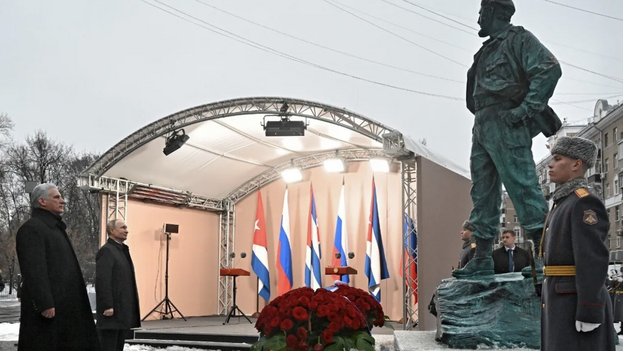
![]() 14ymedio, Pedro Corvo, Miami, 13 February 2022 — In the late 1990s, times when spy Ana Belén Montes successfully insisted that Castroism was not dangerous for the United States — an assertion that resonated with some US officials who have always looked on the island dictatorship with fondness — a considerable number of Cubans rejected that assertion, arguing that the aggressive nature of the regime did not allow it to overlook any opportunity that would allow it to affect US interests.
14ymedio, Pedro Corvo, Miami, 13 February 2022 — In the late 1990s, times when spy Ana Belén Montes successfully insisted that Castroism was not dangerous for the United States — an assertion that resonated with some US officials who have always looked on the island dictatorship with fondness — a considerable number of Cubans rejected that assertion, arguing that the aggressive nature of the regime did not allow it to overlook any opportunity that would allow it to affect US interests.
However, everything seemed to indicate that after Fidel Castro’s death, the imperialist influence of the project he sponsored would lose momentum. This because, during Raúl Castro’s term of office, there was a notable decrease in Cuba’s participation in the international arena. This a situation that has been slowly changing since the hand-picked dictator, Miguel Díaz-Canel, “received,” at least apparently, “the baton,” as the head of government was identified by the compatriots of the beginning of the last century.
Island totalitarianism has taken at least two particularly intense initiatives. One towards the interior of the country, through which it controls power and the other towards the exterior, in order to gain political clients and associates, who have been particularly useful to it over the years. In addition, the Castro regime has masterfully used its real or supposed successes abroad, making them an essential part of its coliseum or circus with the aim of manipulating the population, aware of the chauvinistic vision that many Cubans suffer from.
Díaz-Canel’s first trip as head of Cuba’s failed state was to Venezuela, a visit that ensures the mutual dependence of both regimes. The island supplies repressive experience and social control and Caracas continues to provide vital oil. This was shown by an agency report that the Venezuelan government bought approximately 440 million dollars worth of crude oil abroad and shipped it to Cuban ports under very favorable payment conditions.
There is no doubt: it is increasingly easy to conclude that the ties between these countries are a kind of parody of the relations between Benito Mussolini and Adolf Hitler, both autocrats of the same ilk.
It must be acknowledged that the hand-picked President is adapting to the times and, contrary to what his predecessors did, he travels with his wife, Lis Cuesta, who, it seems, enjoys the advantages of being the “First Combatant” as they say in our beloved Venezuela.
To this difference with the Castro brothers we must add a similarity, and that is that the despot travels with a bodyguard who, moreover, is his stepson, a situation that shows that nepotism is a constant in that old dictatorship.
The island’s press, always loyal to the boss, has highlighted Díaz-Canel’s numerous trips abroad since he was appointed dictator, describing him as “tireless president,” a title not as distinguished as those granted to Fidel Castro.
The international exposure of this most faithful servant, a label deserved because he took other distinguished vassals out of the game, such as Carlos Lage, Roberto Robaina and Felipe Pérez Roque, among others, has been constant, if we bear in mind that in his first eight months in office he made 11 trips abroad. He demonstrated on one of them, to Jamaica, that he is as much a liar as the Castro brothers, because he brazenly said that Cuba was “perfecting socialism” and building a “prosperous and sustainable” nation, while in his appearance at the United Nations he spoke cynically about his commitment to fight chronic hunger, a constant in his government, as in that of his benefactors.
One of his most recent trips was to Algeria, Russia, Turkey and China, countries he visited in search of vital aid for his regime, while reiterating to Colonel Vladimir Putin his unrestricted support for the invasion of Ukraine, a support that Kiev should evaluate, if it is true that “the friend of my enemy is my enemy”.
Díaz-Canel is irredeemably faithful to the Castroist route of being an ally of countries hostile to the United States, as evidenced by the Iranian Foreign Minister’s visit to the Cuban capital and Pyongyang’s vaunted and invincible friendship with Havana.
Translated by: Hombre de Paz
____________
COLLABORATE WITH OUR WORK: The 14ymedio team is committed to practicing serious journalism that reflects Cuba’s reality in all its depth. Thank you for joining us on this long journey. We invite you to continue supporting us by becoming a member of 14ymedio now. Together we can continue transforming journalism in Cuba.
